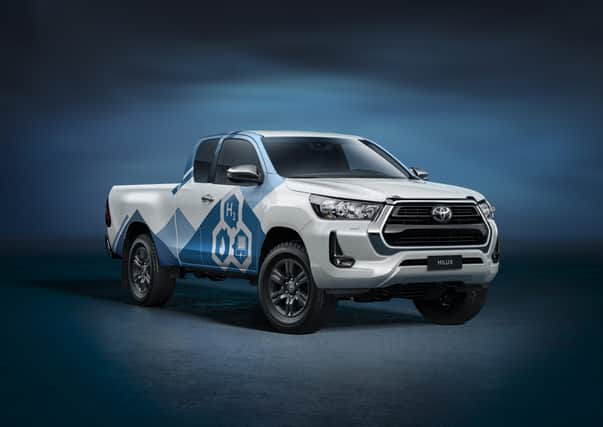Toyota secures £11.3m funding to build hydrogen-powered Hilux


Toyota has announced that it will build a hydrogen fuel cell version of its Hilux pick-up as part of a multi-fuel approach to zero-emissions vehicles.
The Japanese firm has secured £11.3 million in funding, including £5.6m from the UK government, to develop the vehicle alongside four engineering partners at its factory in Burnaston, Derbyshire. A prototype vehicle is already under construction, with plans for a small-scale production run.
Advertisement
Hide AdAdvertisement
Hide AdToyota is the only car company to sell a hydrogen fuel cell car in the UK - the Mirai - and is using the technology from that to develop the Hilux FCEV. It says that a hydrogen-fuelled truck is “ideal for use in isolated settings where electric vehicle charging is impractical”.
Matt Harrison, Toyota Motor Europe President and CEO, said: “The UK is one of the key markets for pick-up trucks and an important market for Toyota. This funding represents a tremendous opportunity to develop a zero emission solution in a critical market segment. We would like to thank the UK government for the funding that will enable the consortium to investigate the development of a fuel cell powertrain for the Toyota Hilux, supporting our carbon neutrality ambition.”
Unlike some brands which are focusing entirely on battery electric vehicles, Toyota has said it will continue to work on a range of powertrains, including hydrogen and hybrid. It argues that not every market or customer is ready for pure EVs, with cost, infrastructure and use rendering it unsuitable for many.
Commercial vehicles used in isolated areas - like pick-ups - are one area where hydrogen is seen as a zero-emissions alternative to battery power, alongside heavy transport use in trucks, buses, aviation and maritime use where batteries are seen as impractical.
Advertisement
Hide AdAdvertisement
Hide AdConcerns remain around pollution linked to the production of hydrogen fuel, with some processes resulting in high levels of CO2 emissions, but Toyota argues that greener production methods are being developed. Other car makers are also exploring hyrodgen fuel cell vehicles, including Land Rover with the Defender and BMW, which has just begun small-scale production of the fuel cell-powered iX5.
Alongside fuel cell vehicles, the brand is continuing to explore hydrogen combustion technology, although it is unclear whether this will ever make it to passenger vehicles. Engineers have developed a version of the Corolla Cross SUV that runs on hydrogen using existing engines and hydrogen storage systems. Bosses say it is “around 40% along the path to commercialisation” but are unclear on whether it will ever make it into passenger vehicles. At the same time, the firm has run a hydrogen combustion version of its GR Yaris rally car to test the technology’s suitability for motorsport.
Comment Guidelines
National World encourages reader discussion on our stories. User feedback, insights and back-and-forth exchanges add a rich layer of context to reporting. Please review our Community Guidelines before commenting.
